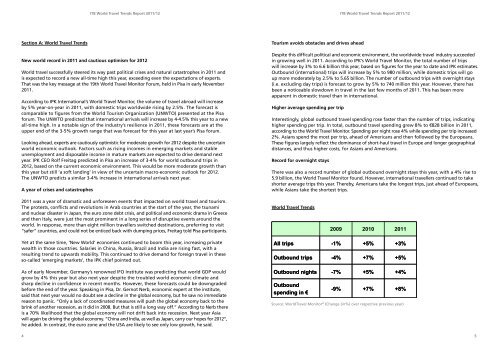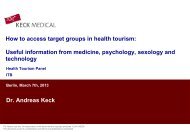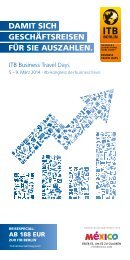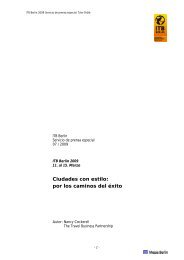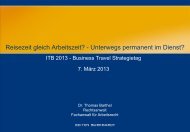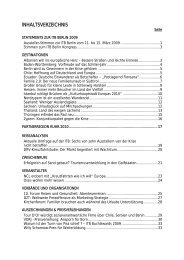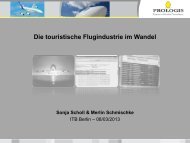itb world travel trends report 2011/2012 - ITB Berlin Kongress
itb world travel trends report 2011/2012 - ITB Berlin Kongress
itb world travel trends report 2011/2012 - ITB Berlin Kongress
Create successful ePaper yourself
Turn your PDF publications into a flip-book with our unique Google optimized e-Paper software.
Section A: World Travel Trends<br />
New <strong>world</strong> record in <strong>2011</strong> and cautious optimism for <strong>2012</strong><br />
<strong>ITB</strong> World Travel Trends Report <strong>2011</strong>/12 <strong>ITB</strong> World Travel Trends Report <strong>2011</strong>/12<br />
World <strong>travel</strong> successfully steered its way past political crises and natural catastrophes in <strong>2011</strong> and<br />
is expected to record a new all-time high this year, exceeding even the expectations of experts.<br />
That was the key message at the 19th World Travel Monitor Forum, held in Pisa in early November<br />
<strong>2011</strong>.<br />
According to IPK International’s World Travel Monitor, the volume of <strong>travel</strong> abroad will increase<br />
by 5% year-on-year in <strong>2011</strong>, with domestic trips <strong>world</strong>wide rising by 2.5%. The forecast is<br />
comparable to figures from the World Tourism Organization (UNWTO) presented at the Pisa<br />
forum. The UNWTO predicted that international arrivals will increase by 4-4.5% this year to a new<br />
all-time high. In a notable sign of the industry’s resilience in <strong>2011</strong>, these forecasts are at the<br />
upper end of the 3-5% growth range that was forecast for this year at last year’s Pisa forum.<br />
Looking ahead, experts are cautiously optimistic for moderate growth for <strong>2012</strong> despite the uncertain<br />
<strong>world</strong> economic outlook. Factors such as rising incomes in emerging markets and stable<br />
unemployment and disposable income in mature markets are expected to drive demand next<br />
year. IPK CEO Rolf Freitag predicted in Pisa an increase of 3-4% for <strong>world</strong> outbound trips in<br />
<strong>2012</strong>, based on the current economic environment. This would be more moderate growth than<br />
this year but still ‘a soft landing’ in view of the uncertain macro-economic outlook for <strong>2012</strong>.<br />
The UNWTO predicts a similar 3-4% increase in international arrivals next year.<br />
A year of crises and catastrophes<br />
<strong>2011</strong> was a year of dramatic and unforeseen events that impacted on <strong>world</strong> <strong>travel</strong> and tourism.<br />
The protests, conflicts and revolutions in Arab countries at the start of the year, the tsunami<br />
and nuclear disaster in Japan, the euro zone debt crisis, and political and economic drama in Greece<br />
and then Italy, were just the most prominent in a long series of disruptive events around the<br />
<strong>world</strong>. In response, more than eight million <strong>travel</strong>lers switched destinations, preferring to visit<br />
“safer” countries, and could not be enticed back with dumping prices, Freitag told Pisa participants.<br />
Yet at the same time, ‘New World’ economies continued to boom this year, increasing private<br />
wealth in those countries. Salaries in China, Russia, Brazil and India are rising fast, with a<br />
resulting trend to upwards mobility. This continued to drive demand for foreign <strong>travel</strong> in these<br />
so-called ‘emerging markets’, the IPK chief pointed out.<br />
As of early November, Germany’s renowned IFO Institute was predicting that <strong>world</strong> GDP would<br />
grow by 4% this year but also next year despite the troubled <strong>world</strong> economic climate and<br />
sharp decline in confidence in recent months. However, these forecasts could be downgraded<br />
before the end of the year. Speaking in Pisa, Dr. Gernot Nerb, economic expert at the institute,<br />
said that next year would no doubt see a decline in the global economy, but he saw no immediate<br />
reason to panic. “Only a lack of coordinated measures will push the global economy back to the<br />
brink of another recession, as it did in 2008. But that is still a long way off.” According to Nerb there<br />
is a 70% likelihood that the global economy will not drift back into recession. Next year Asia<br />
will again be driving the global economy. “China and India, as well as Japan, carry our hopes for <strong>2012</strong>“,<br />
he added. In contrast, the euro zone and the USA are likely to see only low growth, he said.<br />
4<br />
Tourism avoids obstacles and drives ahead<br />
Despite this difficult political and economic environment, the <strong>world</strong>wide <strong>travel</strong> industry succeeded<br />
in growing well in <strong>2011</strong>. According to IPK’s World Travel Monitor, the total number of trips<br />
will increase by 3% to 6.6 billion this year, based on figures for the year to date and IPK estimates.<br />
Outbound (international) trips will increase by 5% to 980 million, while domestic trips will go<br />
up more moderately by 2.5% to 5.65 billion. The number of outbound trips with overnight stays<br />
(i.e. excluding day trips) is forecast to grow by 5% to 740 million this year. However, there has<br />
been a noticeable slowdown in <strong>travel</strong> in the last few months of <strong>2011</strong>. This has been more<br />
apparent in domestic <strong>travel</strong> than in international.<br />
Higher average spending per trip<br />
Interestingly, global outbound <strong>travel</strong> spending rose faster than the number of trips, indicating<br />
higher spending per trip. In total, outbound <strong>travel</strong> spending grew 8% to €828 billion in <strong>2011</strong>,<br />
according to the World Travel Monitor. Spending per night rose 4% while spending per trip increased<br />
2%. Asians spend the most per trip, ahead of Americans and then followed by the Europeans.<br />
These figures largely reflect the dominance of short-haul <strong>travel</strong> in Europe and longer geographical<br />
distances, and thus higher costs, for Asians and Americans.<br />
Record for overnight stays<br />
There was also a record number of global outbound overnight stays this year, with a 4% rise to<br />
5.9 billion, the World Travel Monitor found. However, international <strong>travel</strong>lers continued to take<br />
shorter average trips this year. Thereby, Americans take the longest trips, just ahead of Europeans,<br />
while Asians take the shortest trips.<br />
World Travel Trends<br />
2009 2010 <strong>2011</strong><br />
All trips -1% +5% +3%<br />
Outbound trips -4% +7% +5%<br />
Outbound nights -7% +5% +4%<br />
Outbound<br />
spending in €<br />
-9% +7% +8%<br />
Source: WorldTravel Monitor ® (Change (in%) over respective previous year)<br />
5


